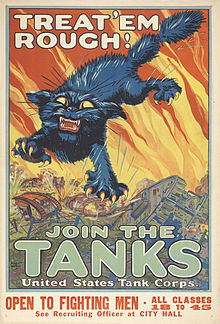Tank Corps of the American Expeditionary Forces
| Tank Corps of the American Expeditionary Forces | |
|---|---|
 Lieutenant Colonel George S. Patton, pictured here in France, in the summer of 1918, standing in front of a French Renault tank. | |
| Active | 22 December 1917[1] to 1920. |
| Country | |
| Branch | |
| Part of | the American Expeditionary Forces |
| Commanders | |
| Commander | Samuel Rockenbach[2] |
The Tank Corps of the American Expeditionary Forces was the mechanized unit that engaged in tank warfare for the American Expeditionary Forces (AEF) on the Western Front during World War I.
Organization
[edit]
Brigadier General Samuel D. Rockenbach, as the Chief of Tank Corps for the American Expeditionary Forces under Pershing, organized, trained, equipped and then deployed the first American tank units to the Western Front of 1918 Europe.[3] An initial plan for 2,000 light Renault FT tanks and 200 heavy British Mark VI tanks was changed to 20 battalions of 77 light tanks each and 10 battalions of 45 heavy tanks each.[4] A total of eight heavy battalions (the 301st to 308th) and 21 light battalions (the 326th to 346th) were raised, but only four (the 301st, 331st, 344th and 345th) saw combat.[5]
Captain George S. Patton, the first officer assigned to the unit, set up a light tank school at Bourg, France, starting on 10 November 1917.[1][6] In the first half of 1918, the 326th and 327th Tank Battalions were organized at Patton's school, while the 301st Heavy Tank Battalion was raised at Camp Meade, Maryland, USA and transported to the British Tank School at Bovington Camp in southern England, for training.[1]
Combat operations
[edit]
The 326th (under the command of Sereno E. Brett) and 327th Tank Battalions (later renamed the 344th and 345th[7] and organized into the 304th Tank Brigade, commanded by Patton), were the first into combat, beginning with the Battle of Saint-Mihiel as part of the US IV Corps on 12 September 1918. The small French Renault FT tanks they were equipped with found the going hard and many were lost or ran out of fuel crossing the battlefield – the Germans, forewarned, had largely retreated from the salient.[8] The tanks then took part in the Meuse–Argonne offensive as part of the US V Corps on 26 September.[5][6][9] Major Brett assumed command of the 304th after Patton was injured on 26 September, the first day of the Meuse-Argonne Offensive near Cheppy, France.[10]

During the war, two members of the Tank Corps (both from the 344th Battalion) were awarded the Medal of Honor; Donald M. Call and Harold W. Roberts.[11][12]
Post-war
[edit]When the fighting ended on November 11, 1918, the AEF Tank Corps and the units in the United States had about 20,000 men.[13] The AEF Tank Corps was redeployed after the armistice, with the remaining tank corps personnel transferred back to the United States. The Tank Corps, which formed part of the National Army, was formally disbanded in 1920, when the National Army was demobilized and consolidated into the Regular Army. After transfer to Camp Meade, Maryland, the 304th and 305th Tank Brigades were consolidated and redesignated several times, together eventually forming the 1st Tank Regiment on 1 September 1929. This unit was again reorganized and redesignated as the 66th Infantry Regiment (Light Tanks) on 25 October 1932, and remains in active service as of 2024. Now known as the 66th Armor Regiment, it is the oldest armored unit in the modern US Army.
References
[edit]- ^ a b c Venzon, Anne Cipriano (1995). The United States in the First World War: An Encyclopedia p. 726. Taylor & Francis. ISBN 0-8240-7055-0.
- ^ Wilson, Dale, p. 19
- ^ Rockenbach, Samuel (2016). The Rockenbach Report. Silver Spring, Maryland: Dale Street Books. pp. 9–72. ISBN 9781941656365.
- ^ Wilson, Dale. The American Expeditionary Forces Tank Corps in World War I: From Creation to Combat (PDF) (Thesis). Archived (PDF) from the original on 3 March 2016.
- ^ a b Rinaldi, Richard A. (2004). The US Army in World War I – Orders of Battle. Tiger Lily Publications LLC. ISBN 0-9720296-4-8.
- ^ a b Votaw, John; Duncan Anderson (2005). The American Expeditionary Forces in World War I. Osprey Publishing. ISBN 1-84176-622-4.
- ^ Hoffman, George F (1999). Camp Colt to Desert Storm. University Press of Kentucky. ISBN 0-8131-2130-2.
- ^ Campbell, Christy (2007). Band of Brigands. pp. 451–2. ISBN 978-0-00-721459-4.: 452
- ^ "U.S. Military History Companion: Army Combat Branches: Armor". answers.com. Retrieved 11 October 2008.
- ^ Rockenbach, Samuel (2016). The Rockenbach Report. Silver Spring, Maryland: Dale Street Books. p. 48. ISBN 9781941656365.
- ^ "Medal of Honor recipients". United States Army Center of Military History. 3 August 2009. Retrieved 6 January 2010.
- ^ "Californians and the Military Corporal Harold W. Roberts Medal of Honor Recipient". militarymuseum.org. Retrieved 9 September 2019.
- ^ AK-Interactive S.L. 2014, p. 91.
- AK-Interactive S.L. (2014). WWI: The First Mechanized War. AK-Interactive S.L. - Total pages: 172
